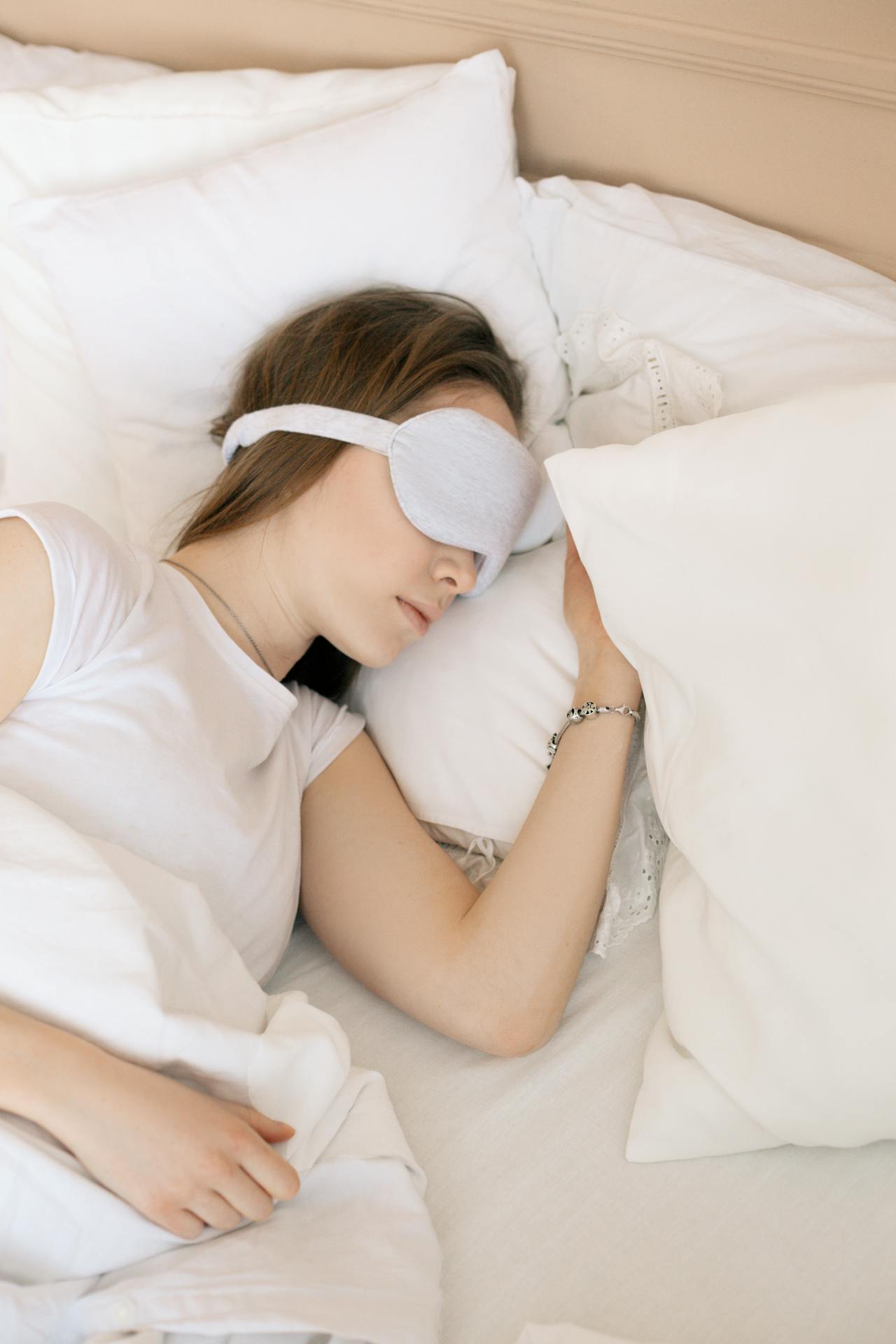
What happens in your body when you sleep too little
Imagine that prolonged sleep deprivation is like trying to live with a battery that never really gets fully charged. The longer you go without enough sleep, the more your body and mind are affected.
At first, you may notice that you find it harder to concentrate, or that you get irritated more easily. It can feel like small things become big problems, and you start to feel emotionally drained. But as the sleep deprivation continues, the effects start to become more widespread.
Content of the article

Causes
There are several common causes of sleep deprivation, both external and internal factors. Here are some of the most common:
- Stress and anxiety that make it difficult for the brain to turn off thoughts and relax
- Poor sleep habits in the form of irregular sleeping times, a lot of screen time in the evening, or consuming caffeine and alcohol late in the day
- Sleep apnea, restless legs syndrome and insomnia
- Irregular working hours and shift work that disrupt the natural circadian rhythm
- Family and life situations, such as young children or elderly relatives who need round-the-clock care
- Chronic pain, allergies or other physical conditions
- Poor sleeping environment in terms of background noise, the room being too bright, the bed being uncomfortable or it being too hot
- Depression and mental health
Symptoms of prolonged sleep deprivation
With prolonged sleep deprivation, you may experience headaches, dizziness or feel tired all the time, no matter how much you try to rest. Your body is in a constant state of stress, and this affects your hormones and immune system.
Symptoms of prolonged sleep deprivation also affect the brain. Your thoughts become slower, and you may find it difficult to make decisions or solve problems. Many people find that they start to feel down or even depressed. Without sleep, the brain cannot process emotions and manage stress - instead, feelings of depression and anxiety worsen.
- Fatigue and exhaustion during the day
- Difficulties with concentration and focus
- Memory impairment
- Mood swings and irritability
- Reduced motivation and productivity
- Increased sensitivity to stress
- Headache and dizziness
- Dry or irritated eyes
- Poorer responsiveness
- Impaired motor skills and coordination
- Increased appetite and cravings for sugar or high-calorie foods
- Immune deficiency
- Depression and anxiety
- Difficulties in making decisions
- Decreased sex drive
Consequences of sleep deprivation
Prolonged sleep deprivation has consequences on your physical, mental and emotional health. Your ability to cope with stress is dramatically reduced, and you become more likely to react negatively to adversity. Being perceived as easily irritated and emotionally absent often affects your relationships and social life. Being constantly tired makes it harder to find joy in everyday activities and leads to isolation from others. John Axelsson, professor of sleep at Karolinska Institutet and one of the sleep experts at Sovmer, is researching how our social interactions are affected by sleep deprivation.
Concentration and memory deteriorate and you find it difficult to complete tasks or learn new things. Suddenly, sleep deprivation also affects your work or studies. You are more likely to get into dangerous situations and the risk of accidents increases as your reaction time deteriorates and you can no longer make quick decisions.
When you don't get enough sleep, your risk of serious diseases such as heart disease, diabetes and high blood pressure increases. It's as if your whole system starts working against you instead of with you. Really prolonged sleep deprivation can cause your body to shut down completely and your heart to stop beating, usually within a year and a half.

If you do not sleep for 72 hours
Not sleeping for three days creates strong reactions in the body. After 72 hours without sleep, the effects become more extreme and can even be dangerous.
- Muscles will have difficulty functioning normally and you may find it difficult to move smoothly or perform simple movements. Reactivity becomes severely impaired.
- The body has difficulty resisting infections.
- Your body cannot regulate its temperature normally and you feel abnormally hot or cold.
- You may experience palpitations and irregular heartbeat.
- You start hallucinating and may see or hear things that are not there.
- The brain has difficulty distinguishing between real and irrational thoughts. Paranoia and excessive suspicion are not uncommon.
- Anxiety grows stronger
- The body enters short periods of so-called microsleep, where you involuntarily fall asleep for a few seconds.
- You feel confused and have difficulty understanding what is happening around you.
- It becomes more difficult to remember what you have just said or done.
- You start acting impulsively and take unnecessary risks without realizing the consequences.
If you have not slept for 72 hours, seek outside help. Get in touch with your health center or your psychiatric clinic. You can also make a own request for help to units that offer sleep CBT.
You can do this yourself
There are many things you can do yourself to try to sleep better. If none of these tips work, you may need to seek help through your healthcare provider.
- Create a regular sleep routine
- Avoid screens before bedtime
- Create a peaceful sleep environment
- Avoid caffeine and nicotine late in the day
- Avoid alcohol before bedtime
- Be physically active during the day
- Avoid large meals late at night
- Try relaxation techniques
- Use the bed only for sleep and rest
- Avoid naps during the day
- Write down your thoughts
- Get up if you can't sleep
- Limit fluid intake in the evening
- Get daylight every day
Treatment
How to treat sleep difficulties depends on the cause, but there are several methods that have been shown to be effective in improving sleep. Both cognitive behavioral therapy (CBT) and medication can be used, either individually or in combination to improve sleep health.
Sleep well
How you feel in your bedroom can affect your sleep quality more than you think. Creating an environment that promotes relaxation and rest is one of the easiest and most effective ways to improve your sleep. Here are some ways to improve the environment you sleep in.
- Blackout
A dark room helps the body produce melatonin, the body's own hormone that regulates sleep and wakefulness. Use blackout curtains or a sleeping mask to block out light. - Temperature
The bedroom should be cool and well ventilated. A temperature of around 16-18 degrees Celsius is considered optimal for sleep. - Silence and calm
If you sleep in a noisy environment, turn off disturbing sounds or use earplugs. Some people find that white noise or soothing sounds can help mask disturbing sounds. - Bed comfort
Invest in a quality bed and replace old pillows and mattresses when they lose their shape and support. Vindeln is an adjustable bed that is made to your needs. - A weighted blanket
A weighted blanket gives you a snug and safe feeling that helps you relax and fall asleep faster. Our Wilhelmina weighted blanket is especially good for people with a lot of anxiety or stress. - Pillow
A good pillow provides proper support to the neck and spine, and reduces the risk of pain and stiffness. Our Strömsund pillow is made of environmentally friendly and hypoallergenic Talalay latex which molds to the shape of your head and neck and maintains a comfortable temperature throughout the night.
Sleep CBT
Cognitive behavioral therapy for sleep problems is an evidence-based treatment that focuses on changing thoughts and behaviors that negatively affect sleep. Together with a therapist, you will learn strategies to improve your sleep habits and reduce anxiety and stress around sleep. Common elements of sleep CBT include:
- Sleep restriction
Limiting the time in bed to only the time you actually sleep. - Stimulus control
Avoiding activities such as working, watching TV or using your phone in bed. - Cognitive restructuring
Identifying and changing negative thoughts about sleep that contribute to anxiety and insomnia. - Relaxation techniques
Techniques such as deep breathing, mindfulness or progressive muscle relaxation.
Pharmaceuticals
Medication can be a short-term solution to deal with acute sleep problems. You can take sleeping pills, melatonin or antihistamines to fall asleep faster and sleep longer. Calmelin, a dietary supplement, can help you manage stress and focus during the day for a better night's sleep.
Please note that medication should only be used for a short period of time and in consultation with a doctor, as it does not always address the root cause of sleep problems.

